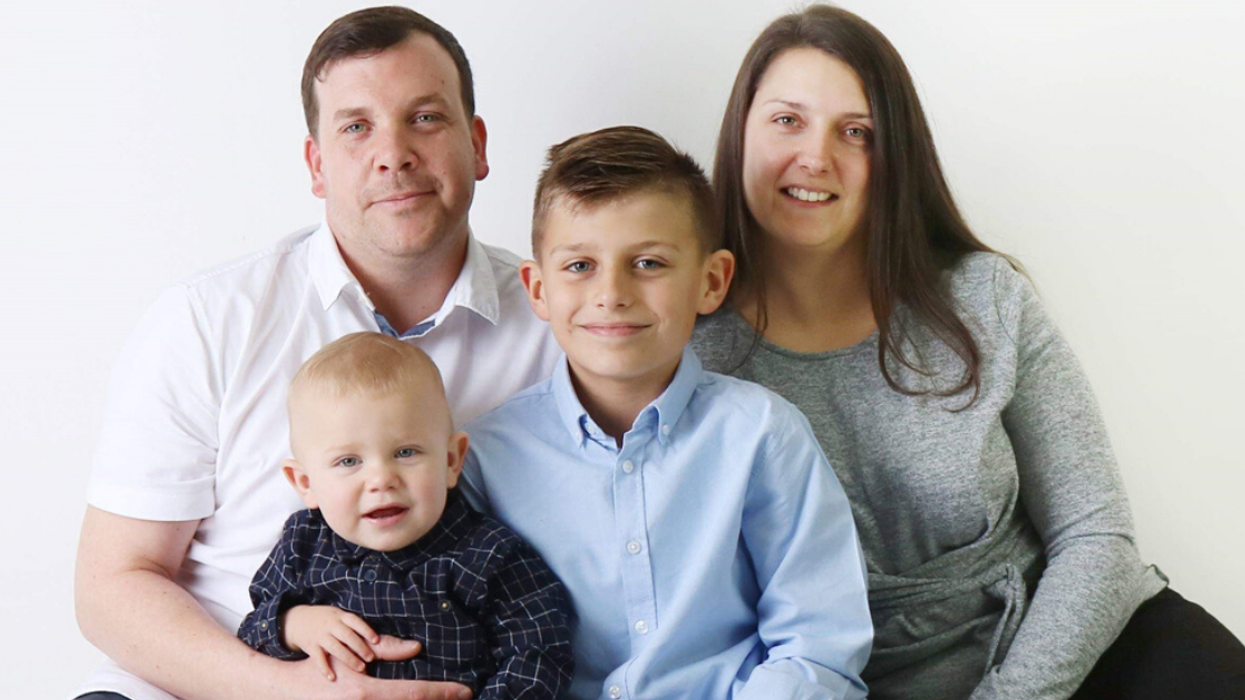Having a son or daughter diagnosed with a fatal illness is something parents never want to go through. This mom wants to share her story of planning her seven-day-old baby's funeral.
Jack Francis was born healthy, but suffered of constipation at a week old. Emma Francis and James Godfrey were concerned with the baby's change in behavior. Godfrey decided to call an emergency line.
“I thought he was just being an overcautious parent. He said that Jack was breathing hard, grunting and looked constipated," Francis said.

“But I struggled to breastfeed with both my boys and had to bottle feed, which I know can sometimes cause constipation, so I put it down to that," she continued.
“Still James kept saying, 'This isn't right', so we called 111 and they told us to take Jack to the doctors immediately. At the time I remember thinking 'All of this because he can't poo – it's a bit over the top.' Now I thank God he was so insistent."

Jack was prescribed laxatives for constipation, but when he was examined, the GP made an alarming diagnosis.
“Putting the phone down, he told us Jack had a high temperature, a rash that had just appeared and a racing heart," she said. “He said the symptoms suggested he had suspected sepsis."
“I just melted into a pile and my world fell apart. I kept thinking, 'Jack could die at any moment.' “I couldn't believe that 10 minutes earlier I'd been thinking this was all a bit dramatic – and now I was facing the prospect of my baby dying."
Jack was picked up by an ambulance and injected with antibiotics on arrival, and given a lumbar puncture to be checked for meningitis or sepsis.
Hearing that her baby had sepsis, Francis was devastated and tried to downplay the news to protect both her sons.

Over the next six days she was plagued by dark thoughts of attending her baby's funeral.
“I kept planning Jack's funeral and imagining what it would be like in my head. I couldn't sleep, I just felt like I was living a nightmare," she said.
Sepsis occurs when the immune system overreacts to an infection and starts to damage the body's own tissues and organs, according to the NHS.

“I can barely bring myself to think about what would've happened if James hadn't been so cautious," she said.
“With sepsis, someone can be fine one minute and on the brink of death the next. If I have to relive that nightmare by retelling Jack's story one hundred times a day to raise awareness then I will."

Symptoms of sepsis in babies can include blue, pale or blotchy skin, lips or tongue, a rash, difficulty breathing, a weak, high-pitched cry and sleepiness, according to the NHS.
Getting pregnant was a happy moment for the couple.
“One morning I woke up at 5:30am after having a really vivid dream that I was pregnant," said Francis.
“I told James and he said, 'I think you are pregnant, haven't you noticed every night for the past week I've been falling asleep with my hand on your stomach?'"
The family was incredibly excited.

Even David couldn't wait. “When he found out he was having a little brother – it was like all his dreams had come true," said Francis.
On November 2, 2017, Francis gave birth.
“I was given gas and air, but Jack's heart rate was dropping, and I was told I needed to push him out quickly," she said.

“I didn't need to be told twice and within 25 minutes he was out. He did a little poo on himself, but besides that, Jack was completely fine," she continued.
“I'll never know what caused the sepsis – but the poo he did is the only thing that sticks in my mind."
Despite Jack's little accident, Francis says he was a “happy and healthy" baby.

“We were both besotted with him and I just couldn't wait to get him back home so Daniel could meet him," she said.
“Everything was fine at first. When Daniel was born, he had pyloric stenosis, a condition that stops milk or food passing into the bowel to be digested, so we were told to look out for symptoms for that, because it can be hereditary."
“Jack fed well and didn't projectile vomit, though, so we presumed everything was okay."
Everything changed when Jack was diagnosed with sepsis. Thankfully, after a rollercoaster six-day journey, he pulled through.
“It wasn't until that day that we actually found out how ill Jack had been," Francis said. “He'd been so close to dying it was a miracle he survived. If it hadn't been for the quick-thinking doctor at the GPs and if James hadn't kicked up such a fuss, he probably wouldn't be here today."

While Jack is now a thriving two-year-old, Francis has been left riddled with fear.
“I have this feeling of impending doom just hanging over me," Francis said.
“Nowadays I'm at the doctor's surgery with Jack at least once a week – and that's not an exaggeration."

“He only has to sneeze, and I'll be asking the doctor 'Is he going to die?'" she added.
Now she is so concerned that other parents should know about sepsis that she has shared Jack's story with the local playgroup he attends, in the hope that they'll share it with all the surrounding playgroups to raise awareness.
“Before I had Jack I didn't know about sepsis or how harmful it could be," Francis said.

“I want to make sure that other parents have heard of it and know what to look out for, because it can be deadly," she continued.
“That's why the work of organizations like Sepsis Research is so vital – it literally saves lives. If you're a parent and you've got the tiniest concern about your child – act on it – otherwise it could be too late."

Colin Graham, chief operating officer of Sepsis Research (FEAT), stresses the importance of people being able to recognize the symptoms of sepsis.
“We are the only UK charity dedicated to raising funds for sepsis research," he said.
“Our aim is to increase awareness of sepsis, to help improve diagnosis and medical care and to identify why treatments are more effective for some people than others."
“With more public support we will increase the amount of backing we are able to provide for research with the aim of putting a stop to an illness which can kill and for those who survive can have life-changing consequences such as the loss of limbs."
More information on Sepsis Research (FEAT) can be found at www.sepsisresearch.org.uk














 Dinner Cooking GIF
Dinner Cooking GIF  Dont Care Not Listening GIF by MOODMAN
Dont Care Not Listening GIF by MOODMAN  toy daughter GIF
toy daughter GIF  Television Tuning GIF
Television Tuning GIF  Tea Time Energy GIF by INTO ACTION
Tea Time Energy GIF by INTO ACTION 
 @matterneuroscience/Instagram
@matterneuroscience/Instagram @matterneuroscience/Instagram
@matterneuroscience/Instagram @matterneuroscience/Instagram
@matterneuroscience/Instagram @matterneuroscience/Instagram
@matterneuroscience/Instagram @matterneuroscience/Instagram
@matterneuroscience/Instagram @matterneuroscience/Instagram
@matterneuroscience/Instagram @matterneuroscience/Instagram
@matterneuroscience/Instagram @matterneuroscience/Instagram
@matterneuroscience/Instagram @matterneuroscience/Instagram
@matterneuroscience/Instagram @matterneuroscience/Instagram
@matterneuroscience/Instagram
 @karaandlife/TikTok
@karaandlife/TikTok @karaandlife/TikTok
@karaandlife/TikTok @karaandlife/TikTok
@karaandlife/TikTok @karaandlife/TikTok
@karaandlife/TikTok @karaandlife/TikTok
@karaandlife/TikTok @karaandlife/TikTok
@karaandlife/TikTok @karaandlife/TikTok
@karaandlife/TikTok @karaandlife/TikTok
@karaandlife/TikTok @karaandlife/TikTok
@karaandlife/TikTok @karaandlife/TikTok
@karaandlife/TikTok @karaandlife/TikTok
@karaandlife/TikTok @karaandlife/TikTok
@karaandlife/TikTok @karaandlife/TikTok
@karaandlife/TikTok @karaandlife/TikTok
@karaandlife/TikTok @karaandlife/TikTok
@karaandlife/TikTok @karaandlife/TikTok
@karaandlife/TikTok @karaandlife/TikTok
@karaandlife/TikTok
 @talashatara/TikTok
@talashatara/TikTok @talashatara/TikTok
@talashatara/TikTok @talashatara/TikTok
@talashatara/TikTok @talashatara/TikTok
@talashatara/TikTok @talashatara/TikTok
@talashatara/TikTok @talashatara/TikTok
@talashatara/TikTok @talashatara/TikTok
@talashatara/TikTok @talashatara/TikTok
@talashatara/TikTok @talashatara/TikTok
@talashatara/TikTok @talashatara/TikTok
@talashatara/TikTok @talashatara/TikTok
@talashatara/TikTok